Mercedes Vito Bus vs VW Touran - Differences and prices compared
Costs and Efficiency:
Price and efficiency are key factors when choosing a car – and this is often where the real differences emerge.
VW Touran has a minimal advantage in terms of price – it starts at 35400 £, while the Mercedes Vito Bus costs 36300 £. That’s a price difference of around 935 £.
Fuel consumption also shows a difference: VW Touran manages with 5.20 L and is therefore distinct more efficient than the Mercedes Vito Bus with 6.70 L. The difference is about 1.50 L per 100 km.
Engine and Performance:
Under the bonnet, it becomes clear which model is tuned for sportiness and which one takes the lead when you hit the accelerator.
When it comes to engine power, the Mercedes Vito Bus has a noticeable edge – offering 237 HP compared to 150 HP. That’s roughly 87 HP more horsepower.
In terms of top speed, the VW Touran performs evident better – reaching 209 km/h, while the Mercedes Vito Bus tops out at 140 km/h. The difference is around 69 km/h.
There’s also a difference in torque: Mercedes Vito Bus pulls distinct stronger with 500 Nm compared to 360 Nm. That’s about 140 Nm difference.
Space and Everyday Use:
Cabin size, boot volume and payload all play a role in everyday practicality. Here, comfort and flexibility make the difference.
Seats: Mercedes Vito Bus offers clearly perceptible more seating capacity – 8 vs 5.
In curb weight, VW Touran is noticeable lighter – 1520 kg compared to 2023 kg. The difference is around 503 kg.
In terms of boot space, the Mercedes Vito Bus offers noticeable more room – 1390 L compared to 834 L. That’s a difference of about 556 L.
In maximum load capacity, the Mercedes Vito Bus performs clearly better – up to 4990 L, which is about 3010 L more than the VW Touran.
When it comes to payload, Mercedes Vito Bus significantly takes the win – 1077 kg compared to 601 kg. That’s a difference of about 476 kg.
Who comes out on top?
Overall, the Mercedes Vito Bus shows itself to be is largely superior and secures the title of DriveDuel Champion.
It convinces with the more balanced overall package and proves to be the more versatile choice for everyday use.
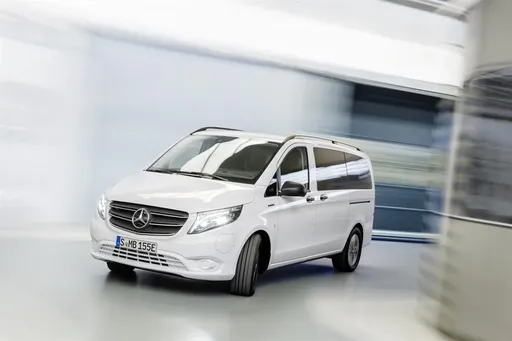 @ Mercedes-Benz Group Media
@ Mercedes-Benz Group Media
Mercedes Vito Bus
Costs and Consumption
View detailed analysis
Engine and Performance
View detailed analysis
Dimensions and Body
View detailed analysis
Mercedes Vito Bus
The Mercedes Vito is a sturdy, no-nonsense people carrier that blends commercial practicality with a surprisingly civilised cabin, making long shuttles feel less like a chore. If you need a dependable transporter that swallows luggage, forgives hard use and still looks a touch more premium than a plain van, the Vito is an easy, sensible pick.
details @ Mercedes-Benz Group Media
@ Mercedes-Benz Group Media
VW Touran
The VW Touran is a sensible family people‑carrier that mixes practical packaging with tidy, German-built refinement, making everyday life with kids and shopping feel a lot less chaotic. If you want a reliable, no-nonsense companion that drives with surprising poise and values usefulness over flash, the Touran is a very persuasive choice.
details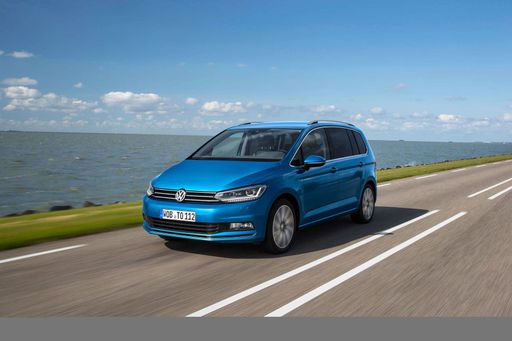 @ Volkswagen AG / VW Media
@ Volkswagen AG / VW Media
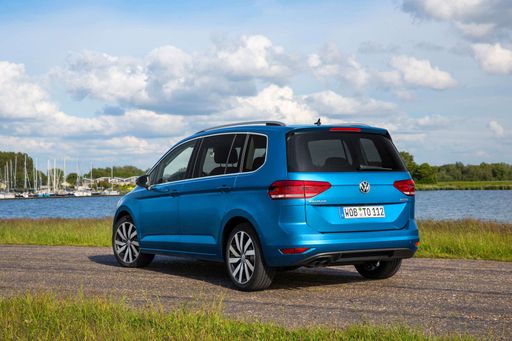 @ Volkswagen AG / VW Media
@ Volkswagen AG / VW Media
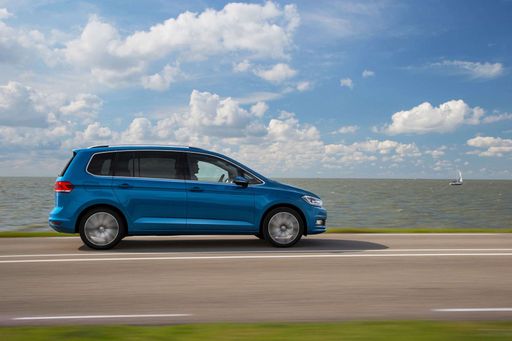 @ Volkswagen AG / VW Media
@ Volkswagen AG / VW Media
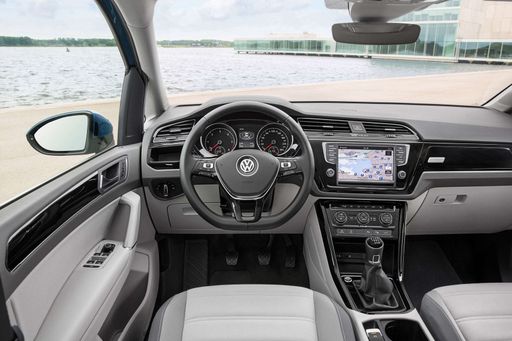 @ Volkswagen AG / VW Media
@ Volkswagen AG / VW Media
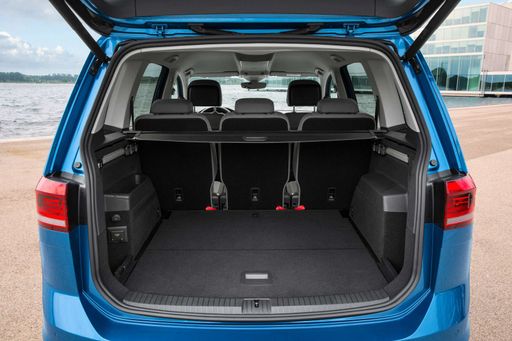 @ Volkswagen AG / VW Media
@ Volkswagen AG / VW Media
 @ Mercedes-Benz Group Media
@ Mercedes-Benz Group Media
|
 @ Volkswagen AG / VW Media
@ Volkswagen AG / VW Media
|
|
|
|
Costs and Consumption |
|
|---|---|
|
Price
36300 - 55900 £
|
Price
35400 - 43900 £
|
|
Consumption L/100km
6.7 - 10 L
|
Consumption L/100km
5.2 - 6.5 L
|
|
Consumption kWh/100km
26.7 - 26.9 kWh
|
Consumption kWh/100km
-
|
|
Electric Range
248 - 370 km
|
Electric Range
-
|
|
Battery Capacity
60 - 90 kWh
|
Battery Capacity
-
|
|
co2
0 - 228 g/km
|
co2
136 - 149 g/km
|
|
Fuel tank capacity
57 - 70 L
|
Fuel tank capacity
58 L
|
Dimensions and Body |
|
|---|---|
|
Body Type
Bus
|
Body Type
MPV
|
|
Seats
8
|
Seats
5
|
|
Doors
4
|
Doors
5
|
|
Curb weight
2023 - 2739 kg
|
Curb weight
1520 - 1631 kg
|
|
Trunk capacity
580 - 1390 L
|
Trunk capacity
834 L
|
|
Length
4895 - 5370 mm
|
Length
4527 mm
|
|
Width
1928 mm
|
Width
1829 mm
|
|
Height
1890 mm
|
Height
1668 mm
|
|
Max trunk capacity
4190 - 4990 L
|
Max trunk capacity
1980 L
|
|
Payload
726 - 1077 kg
|
Payload
590 - 601 kg
|
Engine and Performance |
|
|---|---|
|
Engine Type
Diesel, Electric, Petrol
|
Engine Type
Petrol, Diesel
|
|
Transmission
Automatic
|
Transmission
Manuel, Automatic
|
|
Transmission Detail
Automatic Gearbox, Reduction Gearbox
|
Transmission Detail
Manual Gearbox, Dual-Clutch Automatic
|
|
Drive Type
Rear-Wheel Drive, All-Wheel Drive, Front-Wheel Drive
|
Drive Type
Front-Wheel Drive
|
|
Power HP
136 - 237 HP
|
Power HP
122 - 150 HP
|
|
Acceleration 0-100km/h
-
|
Acceleration 0-100km/h
8.9 - 10.8 s
|
|
Max Speed
140 km/h
|
Max Speed
195 - 209 km/h
|
|
Torque
330 - 500 Nm
|
Torque
250 - 360 Nm
|
|
Number of Cylinders
4
|
Number of Cylinders
4
|
|
Power kW
100 - 174 kW
|
Power kW
90 - 110 kW
|
|
Engine capacity
1950 - 1999 cm3
|
Engine capacity
1498 - 1968 cm3
|
General |
|
|---|---|
|
Model Year
2024
|
Model Year
2024 - 2025
|
|
CO2 Efficiency Class
G, A
|
CO2 Efficiency Class
E
|
|
Brand
Mercedes-Benz
|
Brand
VW
|
What drive types are available for the Mercedes Vito Bus?
The Mercedes Vito Bus is offered with Rear-Wheel Drive, All-Wheel Drive or Front-Wheel Drive.
The prices and data displayed are estimates based on German list prices and may vary by country. This information is not legally binding.
